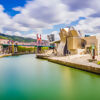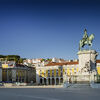14 Nights | Europe
About Cherbourg, France
You will visit the following 11 places:

Gibraltar
Gibraltar is a British Overseas Territory on the south coast of Spain known for the Rock of Gibraltar (a major landmark of the region), a 426m limestone ridge at its centre. It is a very unique place for the curious traveller. You can take the time to explore the caves and tunnels. The inside of the rock is an absolute labyrinth with secret internal roads and tunnels four times longer than those on the surface. Military presence and security in this otherwise deserted area is strong but almost invisible. Also, at the Apes' Den (Queen's Gate) and in the area of the Great Siege Tunnels there is the rare opportunity to see semi-wild primates at close quarters. If you let them, the monkeys will be their captivating selves and behave in their everyday natural manner.

Bilbao
Bilbao is a municipality and city in Spain, a major city in the province of Biscay in the autonomous community of the Basque Country. It is the main urban area in what is defined as the Greater Basque region. Situated in the north-central part of Spain, its main urban core is surrounded by two small mountain ranges. After its foundation in the early 14th century by Diego López V de Haro, head of the powerful Haro family, the city was a commercial hub of the Basque Country that enjoyed significant importance in Green Spain. This was due to its port activity based on the export of iron extracted from the Biscayan quarries. Throughout the nineteenth century and the beginning of the twentieth, Bilbao experienced heavy industrialisation, making it the centre of the second-most industrialised region of Spain. Today, Bilbao is a vigorous service city that is experiencing an ongoing social, economic, and aesthetic revitalisation process, started by the iconic Bilbao Guggenheim Museum, and continued by infrastructure investments, such as the airport terminal, the rapid transit system, the tram line, the Alhóndiga, and the currently under development Abandoibarra and Zorrozaurre renewal projects. Bilbao is also home to football club Athletic Club de Bilbao, a significant symbol for Basque nationalism due to its promotion of Basque players and one of the most successful clubs in Spanish football history.

Grenada
Grenada is an island country consisting of Grenada itself and six smaller islands at the southern end of the Grenadines in the southeastern Caribbean Sea. The islands are of volcanic origin with extremely rich soil. Grenada's interior is very mountainous with Mount St. Catherine being the highest at 840 m (2,760 ft). Several small rivers with beautiful waterfalls flow into the sea from these mountains. It is also known as "Island of Spice" because of the production of nutmeg and mace crops of which it is one of the world's largest exporters.

Lisbon
The capital of Portugal, Lisbon (Portuguese: Lisboa) has experienced a renaissance in recent years, with a contemporary culture that is alive and thriving and making its mark in today's Europe. Perched on the edge of the Atlantic Ocean, Lisbon is one of the rare Western European cities that faces the ocean and uses water as an element that defines the city. Lisbon enchants travellers with its white-bleached limestone buildings, intimate alleyways, and an easy-going charm that makes it a popular year-round destination.

Málaga
Málaga is a large city in the southern Spanish region of Andalucia and capital of the Malaga Province. The largest city on the Costa del Sol, Malaga has a typical Mediterranean climate and is also known as the birthplace of famous Spanish artist Pablo Picasso. The city offers beaches, hiking, architectural sites, art museums, excellent shopping and cuisine. While more laid back than Madrid or Barcelona, Malaga is still the center and transport hub for the hugely popular Costa del Sol region, which is flooded with tourists in the summer, and the city has certainly cashed in on the sun and sand, with lots of new construction as well as hotels and facilities geared to tourists. However, Malaga also offers some genuinely interesting historical and cultural attractions in its old city and its setting on the coast is still beautiful.

Bordeaux
Bordeaux is a port city on the Garonne River in southwest France, with an estimated (2008) population of 250,082. The Bordeaux-Arcachon-Libourne metropolitan area, has a population of 1,010,000 and constitutes the sixth-largest urban area in France. It is the capital of the Aquitaine region, as well as the prefecture of the Gironde department. Its inhabitants are called Bordelais. Bordeaux is the world's major wine industry capital. It is home to the world's main wine fair, Vinexpo, while the wine economy in the metro area moves 14.5 billion euros each year. Bordeaux wine has been produced in the region since the eighth century. The historic part of the city is on the UNESCO World Heritage List as "an outstanding urban and architectural ensemble" of the 18th century.

Barcelona
Barcelona – Spain's enchanting capital, second largest and most populous city. It is a huge city that vibrates with life, and there’s certainly not another city in the country to touch it for its sheer style, looks or energy. It is one of the world's leading tourist, economic, trade fair and cultural centers, and its influence in commerce, education, entertainment, media, fashion, science, and the arts all contribute to its status as one of the world's major global cities. Barcelona is home to masterpieces of many great architects – the most famous of which is Antoni Gaudí.

Zeebrugge

Huelva
Huelva is a city in southwestern Spain, the capital of the province of Huelva in the autonomous region of Andalusia. It is located along theGulf of Cádiz coast, at the confluence of the Odiel and Tinto rivers. The first impression when entering the city of Huelva is its huge modern port and the industrial areas alongside it. Indeed, this industry and the mines close to the city are of essential economical importance. The surrounding Costa de la Luz however has many attractions to offer.

IJmuiden

Cherbourg
Cherbourg-Octeville is a city and former commune situated at the northern end of the Cotentin peninsula in the northwestern French department of Manche. Due to its union, it is the most populated city in its department with 37,121 inhabitants making it the first city of the department before the Saint-Lô prefecture and the second in the region after Caen. Cherbourg-en-Cotentin is protected by Cherbourg Harbour, between La Hague and Val de Saire, and the city has been a strategic position over the centuries, disputed between the English and French. Cited as one of the "keys to the kingdom" by Vauban, it became, by colossal maritime development work, a first-rate military port under the leadership of Louis XVI and Napoleon, and holds an arsenal of the French Navy. A stopping point for prestigious transatlantic liners in the first half of the 20th century, Cherbourg was the primary goal of US troops during the invasion of Normandy in 1944. Along with its use as a military, fishing and yachting port, it is also a cross-Channel ferry port, with routes to the English ports of Poole and Portsmouth, the Irish port of Rosslare Harbour and St Helier on Jersey. Limited by its geographical isolation from being a great commercial port, it is nonetheless an important shipbuilding centre, and a working-class city with a rural hinterland.










